Fisheries
WORK OF THE FISHERIES BRANCH
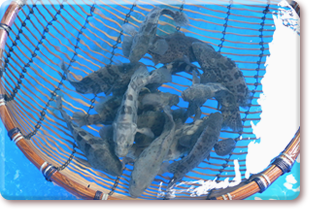
- To provide financial and technical support to fishermen and fish farmers for promoting the sustainable development of the fisheries industry;
- To enforce legislation to regulate the fisheries industry;
- To plan and implement suitable projects and measures for the conservation and management of fisheries resources; and
- To provide administrative support to the Fish Marketing Organization (FMO).
THE FISHERIES INDUSTRY
The fisheries industry, which comprises capture fisheries, mariculture and pond fish culture, provides a steady supply of fresh fish to the local market. In 2012, the production of the capture fisheries and mariculture sectors accounted for about 30% of all seafood consumed in Hong Kong, whereas pond fish farms produced about 3% of the total consumption of freshwater fish.
Capture Fisheries
In 2012, the number of fishing vessels was about 4,000 and that of local fishermen was about 8,800. The main fishing methods are trawling, long-lining, hand-lining, gill-netting and purse-seining. The number of fishing vessels by type is at Appendix 7. In 2012, the industry produced an estimated 155,230 tonnes of fisheries produces, of which about 57,000 tonnes were consumed in Hong Kong.
Mariculture
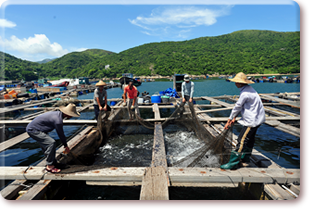
Mariculture involves rearing marine fish in cages suspended by floating rafts in sheltered coastal areas. In 2012, there were 1,008 licensed operators in the 26 fish culture zones designated under the Marine Fish Culture Ordinance (Cap 353), occupying a sea area of 209 hectares. Most licensed operations are small and family-based, with farm size averaging about 290 square metres. Estimated production in 2012 was 1,299 tonnes, or about 7% of all locally consumed live marine fish. A location map of the fish culture zones is at Appendix 8.
Pond Fish Culture
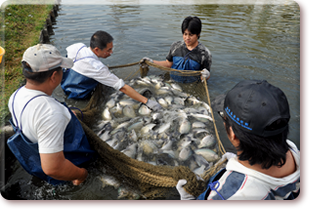
Most inland ponds are located in the Northwest New Territories. These ponds, covering some 1,149 hectares, produced 2,244 tonnes of freshwater fish in 2012. Most ponds practise polyculture of carps mixed with tilapia or grey mullet. Some coastal ponds have been converted to culture brackish species, such as scat, sea bream, pampano and giant grouper, to reap better profits.
SUSTAINABLE FISHERIES DEVELOPMENT
Ban on Trawling in Hong Kong Waters
The Government introduced a ban on trawling in Hong Kong waters to allow the rehabilitation of the damaged seabed and depleted marine resources. The subsidiary legislation for banning trawling in Hong Kong waters came into effect on 31 December 2012.
To assist the fishermen affected by the trawl ban, the Government has introduced a one-off assistance scheme which includes:
- making ex-gratia allowance to affected trawler owners for permanent loss of fishing grounds arising from the trawl ban;
- buying out affected inshore trawler vessels from trawler owners who voluntarily surrender their vessels; and
- providing one-off assistance to the local deckhands employed by the affected inshore trawler owners and to affected fish collector owners.
The Department has launched a special training programme to help the affected fishermen switch to other sustainable fisheries operations, including aquaculture fisheries and recreational fishing. As part of the fisheries management measures, we also plan to use some of the bought-out trawlers as artificial reefs, which are conducive to enhancing the rehabilitation of the fisheries resources and improving the marine habitats in Hong Kong waters.
To bring the fishing industry back to a sustainable path, the Fisheries Protection Ordinance (Cap 171) has been amended and a series of fisheries management measures has been implemented. Such measures include:
- setting up a registration system for local fishing vessels;
- limiting the entry of new fishing vessels and maintaining an appropriate level of fishing effort;
- restricting fishing with the use or aid of non-fishing vessels and prohibiting fishing with the use or aid of non-local fishing vessels; and
- designating fisheries protection areas.
Combating Destructive Fishing Practices
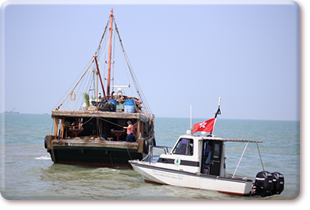 Hong Kong waters are patrolled regularly to deter destructive fishing practices prohibited under the Fisheries Protection Ordinance (Cap 171). These practices include the use of explosives, toxic substances, dredging or suction devices and apparatus that transmits electricity. Five cases of illegal fishing were successfully prosecuted during the year.
Hong Kong waters are patrolled regularly to deter destructive fishing practices prohibited under the Fisheries Protection Ordinance (Cap 171). These practices include the use of explosives, toxic substances, dredging or suction devices and apparatus that transmits electricity. Five cases of illegal fishing were successfully prosecuted during the year.
Artificial Reefs Deployment
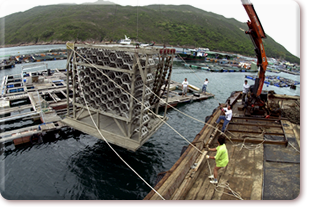 Artificial reefs are effective in promoting the growth and development of various marine organisms which in turn provide food, protection and shelter for fish. Since 1996, the Department has been implementing an artificial reefs programme and some 179,000 cubic metres of artificial reefs have been deployed at suitable locations including Marine Parks, and important fish spawning and nursery grounds in Port Shelter and Long Harbour. Over 220 species of fish, including many high-value ones such as grouper, bream, snapper and sweetlip, have been found using the reefs for feeding and shelter, as well as spawning and nursery. To improve the water quality and seabed condition of fish culture zones, artificial reefs used as biofilters were deployed in the Kau Sai, Sham Wan and Lo Tik Wan fish culture zones. In addition to the routine fish surveys at artificial reefs, the Department commissioned a study on fisheries resources in 2011 to keep monitoring and assessing the effectiveness of various types of artificial reefs on enriching fisheries resources. The study results indicated that fisheries resources at artificial reefs remained comparatively higher than that in natural rocky shore habitats.
Artificial reefs are effective in promoting the growth and development of various marine organisms which in turn provide food, protection and shelter for fish. Since 1996, the Department has been implementing an artificial reefs programme and some 179,000 cubic metres of artificial reefs have been deployed at suitable locations including Marine Parks, and important fish spawning and nursery grounds in Port Shelter and Long Harbour. Over 220 species of fish, including many high-value ones such as grouper, bream, snapper and sweetlip, have been found using the reefs for feeding and shelter, as well as spawning and nursery. To improve the water quality and seabed condition of fish culture zones, artificial reefs used as biofilters were deployed in the Kau Sai, Sham Wan and Lo Tik Wan fish culture zones. In addition to the routine fish surveys at artificial reefs, the Department commissioned a study on fisheries resources in 2011 to keep monitoring and assessing the effectiveness of various types of artificial reefs on enriching fisheries resources. The study results indicated that fisheries resources at artificial reefs remained comparatively higher than that in natural rocky shore habitats.
Support Services
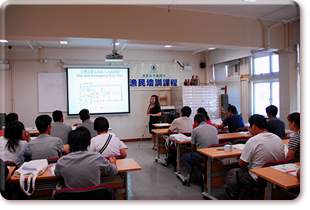 The Department provides technical support, training and liaison services, and credit facilities to fishermen. During the year, the Department continued to liaise with both Mainland and foreign fisheries authorities and agencies to obtain information on recreational fishing, aquaculture, fish processing and other sustainable fisheries operations, and disseminate it to fishermen. Technical advice was also given to fishermen to help formulate their development proposals.
The Department provides technical support, training and liaison services, and credit facilities to fishermen. During the year, the Department continued to liaise with both Mainland and foreign fisheries authorities and agencies to obtain information on recreational fishing, aquaculture, fish processing and other sustainable fisheries operations, and disseminate it to fishermen. Technical advice was also given to fishermen to help formulate their development proposals.
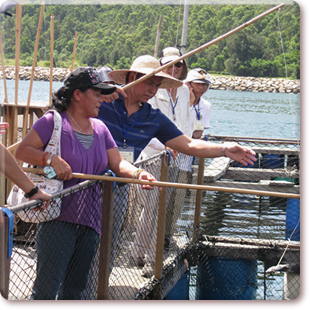 To help some 1,200 local fishing vessels affected by the annual two-and-a-half-month fishing moratorium from mid May to end July in the South China Sea implemented by the Mainland authorities in 2012, fishing moratorium loans were made available to the affected vessel owners under the Fish Marketing Organization Loan Fund. Some 330 fishing moratorium loans totaling $61.7 million were issued to affected fishermen in 2012.
To help some 1,200 local fishing vessels affected by the annual two-and-a-half-month fishing moratorium from mid May to end July in the South China Sea implemented by the Mainland authorities in 2012, fishing moratorium loans were made available to the affected vessel owners under the Fish Marketing Organization Loan Fund. Some 330 fishing moratorium loans totaling $61.7 million were issued to affected fishermen in 2012.
The Department provided 7 free training courses to fishermen during the 2012 fishing moratorium with a view to promoting sustainable fisheries development and assisting fishermen switching to other sustainable fisheries operations.
Fisheries Impact Assessment
To protect fisheries resources and habitats, the Department vets and provides professional advice on development proposals, relevant Environmental Impact Assessment studies as well as monitoring and audit programmes to ensure that the potential impacts of development projects on fisheries have been adequately addressed and evaluated, and that such impacts would be avoided or minimised through effective mitigation. The Department also assists in conducting investigations in fish kills or water quality deterioration incidents allegedly caused by development projects with a view to providing prompt advice on remedial actions and minimising fish loss.
AQUACULTURE
Proper Management of Marine Fish Culture Activities
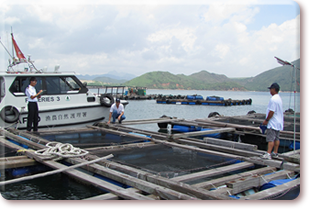
Under the Marine Fish Culture Ordinance (Cap 353), all marine fish culture activities in Hong Kong are required to be operated under licence in designated fish culture zones. The Department conducts regular patrols in these fish culture zones to ensure that fish culture activities comply with the Ordinance and the licence conditions.
To meet the public demand for recreational fishing facilities and to help mariculturists diversify their business, the Department has implemented a scheme allowing mariculturists to operate recreational fishing business on licensed fish culture rafts. As at March 2013, 46 licensees in 11 fish culture zones have been given the permission to conduct such business.
Safeguarding Aquaculture Environment
To minimise the impact of red tides and water quality deterioration on mariculture, the Department regularly monitors water quality of fish culture zones and implements a red tide monitoring and management programme. The latter includes proactive phytoplankton monitoring before the formation of a red tide and rapid risk assessment of reported red tide incidents. A computerised system using Geographic Information System technology was established to help visualise the spatial and temporal distribution of red tides and provide a quick analysis of their development and movement. Prompt red tide warnings and technical advice are disseminated to mariculturists and the public through the red tide support groups set up in various fish culture zones, press releases and the Red Tide website.
Eighteen red tide incidents were recorded in Hong Kong waters during the year. No associated fish kills were reported from these incidents.
Promoting Good Aquaculture Practices
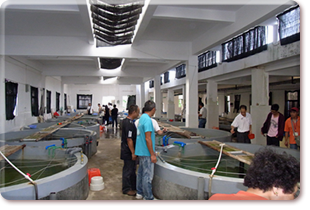
To help fish farmers minimise losses due to fish disease, the Department has put in place a fish health inspection programme. During the year, regular farm visits were conducted to facilitate early detection of disease outbreaks, training was provided to fish farmers on disease prevention measures, and fish disease diagnosis and treatment services were given in case of an outbreak. Under the "Good Aquaculture Practices Programme", the Department visits fish farms regularly to collect water and fish samples for analysis to monitor conditions of the farms. Seminars, on-farm demonstrations and advisory booklets are given to farmers on new techniques and good management practices.
Accredited Fish Farm Scheme
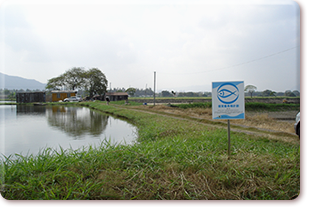
A voluntary Accredited Fish Farm Scheme has been implemented since mid 2005 to enhance the competitiveness of the local aquaculture industry. Participating fish farms are required to adopt a set of good aquaculture practices with a view to raising the environmental hygiene standards of the fish farms and the quality of cultured fish. Quality assurance tests, including analyses of drug residues and heavy metals in fish, are conducted to ensure that all cultured fish meet food safety standards before they are sold in the market. The scheme has been very well received by local mariculturists and pond fish farmers. As at March 2013, a total of 109 fish farms (34 freshwater farms and 75 mariculture farms), representing 19% of the total area of local fish farms, have registered under the scheme. In collaboration with the FMO, the Department continued to publicise and promote the marketing of fish products accredited under the scheme.
Voluntary Registration of Local Aquaculture Farms
To monitor and promote the quality of local aquaculture farms, the Department implements a voluntary registration scheme for local pond fish farms. As at March 2013, 297 pond fish farmers have registered under the scheme.
Promoting Development of Local Fish Hatchery
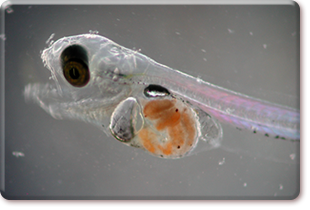 The Department has been conducting fish hatchery trials in Ta Kwu Ling since 2008 and assisting local fish farmers in setting up local hatcheries and nurseries. The jade perch hatchery technology developed by the Department has been successfully transferred to local fish farmers.
The Department has been conducting fish hatchery trials in Ta Kwu Ling since 2008 and assisting local fish farmers in setting up local hatcheries and nurseries. The jade perch hatchery technology developed by the Department has been successfully transferred to local fish farmers.
Organic Aquaculture
The Department has been supporting local fish farmers to further improve their competitiveness in the market by helping them to acquire the knowledge of organic aquaculture and assisting them to obtain relevant accreditation from the Hong Kong Organic Resource Centre for their farms since 2010. Their organic aquaculture products were well received by local consumers.
MARKETING
Ensuring Orderly Wholesale Marketing
The Department provides technical and administrative support to the FMO, a statutory organisation established under the Marine Fish (Marketing) Ordinance (Cap 291) to ensure that orderly fish marketing services are provided to fishermen and fish traders through the wholesale fish markets operated by the FMO. The Department also undertakes enforcement actions against illegal wholesale marketing of marine fish in accordance with Cap 291.
Promotion of Local Fisheries Products
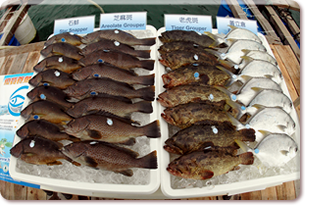 The Department works closely with the FMO to promote local fisheries products. During the year, the FMO continued to develop quality fisheries products at its processing centre and to bring local fisheries products, in particular fish accredited under the Accredited Fish Farm Scheme, to the public through its marketing network.
The Department works closely with the FMO to promote local fisheries products. During the year, the FMO continued to develop quality fisheries products at its processing centre and to bring local fisheries products, in particular fish accredited under the Accredited Fish Farm Scheme, to the public through its marketing network.